Adopting responsible and sustainable sourcing practices enables us to achieve our business goals while reducing negative environmental impacts and supporting equitable outcomes for local communities and people.
This approach creates long-term value for the environment and communities we serve while meeting the expectations of our stakeholders.
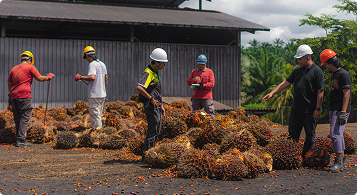
We are committed to achieving full traceability at every stage of FFB production, from the planting of seedlings to the harvesting and transportation of FFB. Similarly, at our palm oil mills, we ensure the traceability of our CPO and PK across the entire production process, encompassing FFB receipt, mill processing, transportation and delivery. These measures are essential for maintaining compliance with the MSPO SCSS, which is renewed every five years for all our mills.
Aligned with our commitment to fostering and responsible resilient supply chain, sustainability is integrated in to every stage of our procurement process - from pre- qualification and supplier registration to annual performance evaluations. All suppliers, both new and existing, are expected to meet our established sustainability standards , which cover ethical practices, health and safety environmental management and respects for human rights
Read MoreSafeguarding local ecosystems and their biodiversity is essential to maintain environmental balance and promoting sustainable development.
As an industry player, we have a responsibility to minimise our impact on habitats in the vicinity of our operations and their surrounding ecosystems.
In FY2024, we made significant progress on our initiative to restore the vital coastal forest and peatland ecosystems of GAFR in Mersing , Johor.
READ MORE on Our Restoration Programme here (link back to the Restoration Prog of GAFR)
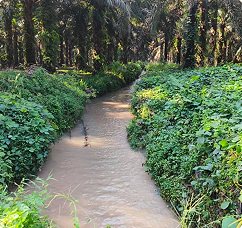 Read More
Read More
We have established buffer zones and riparian reserves within our plantations, covering 597.85 ha. Additionally, we use legume cover crops (“LCCs”) within our reserves to prevent soil erosion, control weeds and enhance the fertility of the soil, further strengthening these important areas.

We cultivate only on peatland designated by the Malaysian government for agricultural development, adhering strict guidelines to ensure sustainable use.
By the end of FY 2024, we owned 44,749.27 ha of peatland, of which 14,924.84 ha was unplanted and contributed to biodiversity and conservation areas.
Our approach focuses on incorporating bio-pesticides and bio-control agents, tailored to the specific needs of each estate. To effectively manage pests while supporting environmental sustainability.
Our efforts include:
Using Tyto Alba, commonly referred to as barn owls, to control rat populations.
Shredding felled trunks into chips of acceptable size to suppress the breeding of rhinoceros beetles.
Planting beneficial plants that provide shelter and food for predators and parasitoids of the pest.
Using Bacillus thuringiensis, a soil dwelling bacterium, against insect pests such as Tirathaba rufivena and bagworm larvae
By responsibly managing waste and maximising the reuse of by-products, we reduce our environmental impact and contribute to the circular economy.
We are committed to upholding responsible management by adhering to environmental regulation and implementing best practices for disposal. Our waste management strategy includes both scheduled (hazardous) and non-hazardous waste ensuring compliance with Malaysia’s Environmental Quality (scheduled Wastes) Regulations 2005. Under these regulations, hazardous waste can only be maintained on-site for no more than 180 days and cannot exceed 20 MT at any given time.
Our newer mills feature advanced processing technology designed to improve operational efficiency and reduce waste generation. Looking ahead, we aim to enhance our waste management efforts by tracking and reporting our total domestic waste collected with the aim of driving progressive improvement over time.
.png)
We transform biomass residue, a by-product of processing FFB into CPO and PK, into fuel and natural fertilisers, creating a sustainable resource that can be used within our operations and beyond.
Read MoreEffective management of our effluent and water discharge drives regulatory compliance and preserves essential and shared natural resources, bringing benefits to local communities.
Treating POME is a vital part of processing FFB as untreated. POME can have severe significant environmental impacts. Stringent internal controls and advances in technology have significantly improved how we manage and monitor the biochemical oxygen demand ("BOD") of this by-product, ensuring better water quality and minimising environmental impact.
To ensure our effluents are treated to the highest standards before discharge, we have installed advanced Tertiary Effluent Treatment Plants ("TETPs") at several of our mills. These systems play a key role in maintaining water quality within safe limits. Other mills are in the process of upgrading their systems to meet anticipated stricter regulations from the DOE.
Bukit Lawiang Mill, in particular, has taken a significant step forward by signing a Shareholders' Agreement with Cenergi RE to develop a biogas plant. This innovative facility is designed to improve the performance of its effluent treatment by capturing methane gas that would otherwise escape into the atmosphere. It will also reduce the BOD of the final effluent water before releasing it into the flatbed system. Construction is currently underway, with the project expected to be completed in 2026.
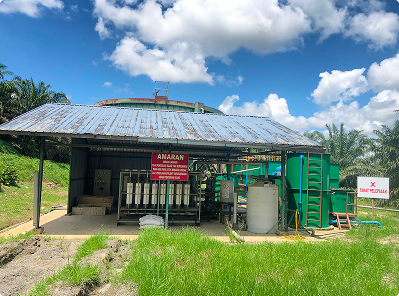
We transform biomass residue, a by-product of processing FFB into CPO and PK, into fuel and natural fertilisers, creating a sustainable resource that can be used within our operations and beyond.
Read MorePrioritising the safety and health of our employees, workers and contractors is essential to protecting them from harm, boosting productivity and preserving the strength of our human capital.
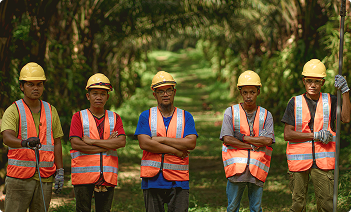
We transform biomass residue, a by-product of processing FFB into CPO and PK, into fuel and natural fertilisers, creating a sustainable resource that can be used within our operations and beyond.
Our OSH Policy and OSH for Chemical Substances Policy, which were recently updated, align with Malaysia's OSH Act 1994 and its 2022 amendment.
Through the SOPs and standards contained within, we continue to ensure our employees receive proper gear, training and supervision while placing focus on preventing workplace accidents and hazards.
Our OSH unit conducts annual audits at all estates and mills to uphold workplace safety and health standards. These audits monitor the implementation of safety and health in accordance with the regulatory framework and provide recommendations for improvement.
In FY2024, the OSH unit completed compliance visits to all 31 estates and six mills to ensure alignment with Malaysia's OSH Act 1994 and enhance our safety systems.
In FY2024, we appointed 36 OSH Coordinators across our HQ, estates and mills in compliance with Section 29A of the OSH Act (Amendment) 2022, empowering a more systematic and effective approach to OSH across our operations.
In 2024, our number of lost time injuries have decreased by 20% compared to the previous year. Additionally, our LTIR has dropped by 46%, partly due to enhanced efforts in awareness, training and continuous monitoring at all levels
To mitigate risks and maintain a safe working environment, we have strengthened our Hazard Identification, Risk Assessment and Risk Control (HIRARC) framework. This framework is reviewed annually and updated as necessary, especially after incidents, to ensure it remains effective
We provide our employees with a range of purpose-fit safety and health-related trainings to keep them updated on processes and foster a safety culture. All workers and employees are assigned specific training schedules according to their job function and are obligated to attend the trainings stipulated, with training participation rates monitored on an ongoing basis. Supporting this, our operation unit reviews training plans for improvement and ensure that we are meeting the needs of our employees and business.
.png)
Human rights are integral to our values and form the foundation of our workforce’s well-being and satisfaction which is essential to our success.
As a key component to our sustainability mandate, respecting and protecting the rights of all individuals ensures and fair and dignified working environment while fostering long term business growth.
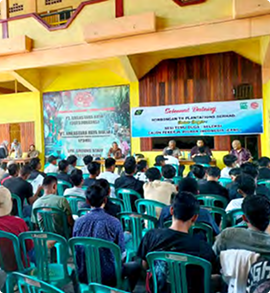
We are committed to upholding the human rights of all of our employees and workers, both local and foreign.
This commitment is guided by our Human Capital(HC) Policies, which outline fundamental human rights principles, including:
We treat all workers fairly and equally, with particular attention given to foreign workers to ensure a smooth transition from their home countries. In doing so, we have instituted thorough hiring and worker welfare practices that strictly forbid foreign workers from being subjected to hidden fees.
Read MoreBuilding strong relationships with surrounding communities fosters trust, supports local development and strengthens our social licence to operate as business.
By creating jobs and offering charitable aid, we also contribute to the socioeconomic advancement of Malaysians, including those from the areas where we operate.
Our Vendor Development Initiative ("VDI") empowers local communities by encouraging entrepreneurship and fostering business opportunities for local business owners. Through this programme, individuals from local communities are supported in establishing their own businesses and provided the skills and capabilities needed to become a business partner of THP Group. This leads to the sharing of economic value within their local communities, creating positive multipliers that benefit a wider range of people.
A key focus of the VDI is supporting Bumiputera contractors and ensuring their active participation in our supply chain. In FY2024, we awarded contracts worth RM117 million through the initiative, with 53% - valued at RM62 million - allocated to Bumiputera businesses.
In 2024, Lembaga Tabung Haji and SME Bank signed a Memorandum of Understanding ("MoU", marked by an exchange ceremony on 8 August 2024 between MEDC and Syarikat Anchor Baharu Program Pembangunan Vendor ("PPV"), with the aim of fostering the growth of Bumiputera vendors in the manufacturing and services sectors.
As part of the LTH Group, we were appointed as an Anchor Company of the programme, under which we will collaborate with the government to strengthen the capacity and capabilities of vendor companies to drive their development and long-term success.
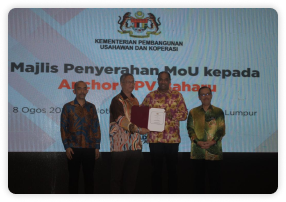
This year, we established the Indonesian Community Learning Centre (CLC) at the Sungai Tenegang Complex, Sabah, to provide quality education for the children of Indonesian workers.Currently, the CLC serves more than 80 children aged 5 to 12, guided by three dedicated teachers. The curriculum adheres to Indonesia's national education standards, with adjustments to meet the unique needs of Indonesian children living in East Malaysia, thereby ensuring they receive a comprehensive and relevant education.
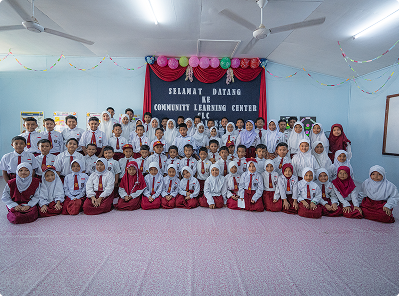
Climate change poses significant risks to ecosystems, economies and communities worldwide, and the onus is upon us to be a part of the solution.
As a player in the oil palm sector, which has been subject to considerable scrutiny from regulators and the general public, it is vital that we take a proactive approach to addressing climate change and its impacts.
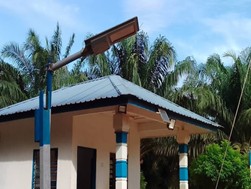
In our commitment to addressing climate change and reducing our GHG emissions, we are guided by our Environmental Policy and our Climate Transition Strategy, which is integrated within the AL-Falah Strategic Business Plan.
Our Climate Transition Strategy focuses on three strategic pillars of our decarbonisation journey:
Pillar 1: Managing Our Emissions.
Pillar 2: Investing in Low Emissions and Green Technologies.
Pillar 3: Leveraging Partnerships and Collaborations.
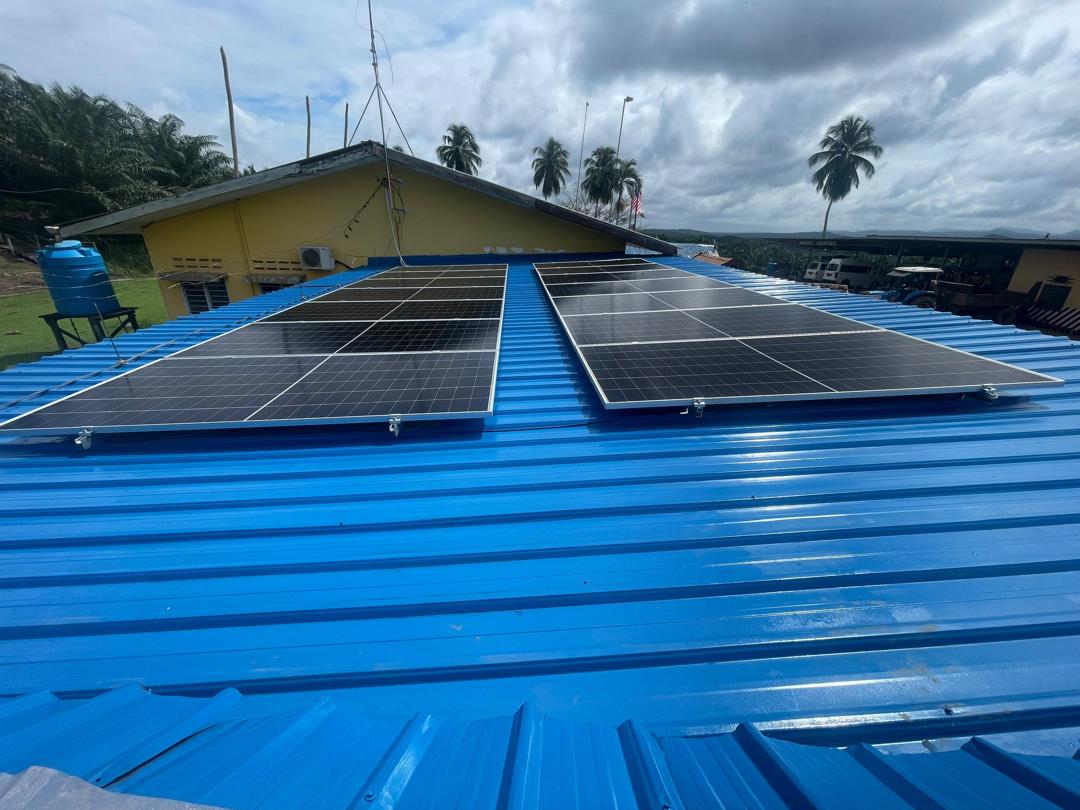
We have adopted a range of strategies to reduce and remove our GHG emissions including:
Setting up of biogas plant. Download Carbon Credit Project
Installing rooftop solar panels at our mills, estates and office buildings.
Upgrading our boilers and turbines to be more energy efficient.
Utilising fibres and palm kernel shells as fuel for renewable energy (RE).
Exploring electric vehicles (EVs) at our estates.
Improving our operational processes - including better peatland management, optimised waste management, and more - to reduce unnecessary emissions.
Strictly adhering to our zero-burning policy.